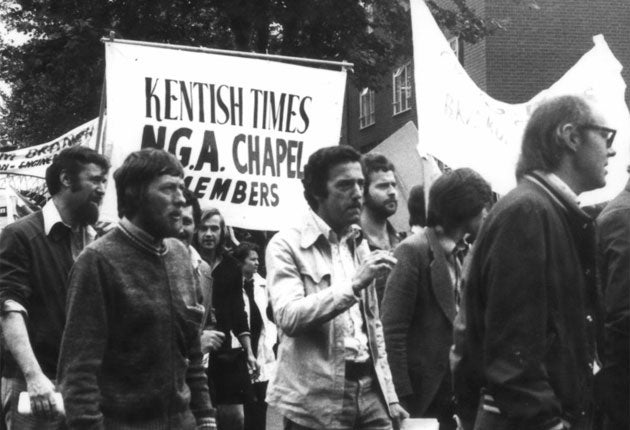John Breen: Union leader who fought for his members' interests during the Wapping dispute

John Breen, a Fleet Street Imperial Father, was a legend to his members and an anathema to newspaper managements; sometimes at odds with the national officials of his trade union, the National Graphical Association (NGA), he was thought to have earned more suspensions from the workplace than any other official in the national newspaper industry.
A passionate believer in the trade union movement, "Breen" as he was known to all, possessed boundless enthusiasm and energy for many causes, though none was more important to him than the solidarity and the well-being of his chapel members.
The chapels, in existence since Caxton set up the first printing press, were individual bargaining units run as mutual benefit societies. They were known in the trade as "the companionship". They were closed shops and the fathers – the shop stewards of the newspaper industry – controlled shifts and overtime and allocated jobs. An ambitious father could expect higher office in the union or even a management job but Breen said he was at the top already; he controlled four chapels; all contact with the management came through him.
Born in Wexford, Ireland, he was seven when his parents moved to London to go in to service with a Harley Street physician; seeing Breen's poor state of health the doctor financed Breen's education in a country boarding school. He left there at 15 and, moving to Shoreditch, began a seven-year apprenticeship as a compositor, working in several print houses until 1971, when he was recruited to the News of the World composing room. The compositors considered themselves to be Fleet Street's élite and were known for their speed and efficiency in setting the journalists' copy into type. They prided themselves on being able to meet the deadlines so vital in national newspaper production. Breen loved the hot metal skills; but he spoke openly of the "monopoly power" of the compositors and he was never short of an overwhelming mandate from his members for industrial action.
The NGA leadership was well aware of the threats to the union movement from the government of Margaret Thatcher and in their last years in Fleet Street there was a feeling of pessimism, a belief that if the miners lost their strike then the printers would be next. Breen collected more money than any single person for the miners and it was due to him that the chapels donated more than £1m to the cause.
On behalf of the miners, Breen and his close friend, John Brown, the Imperial Father of the Sun composing room, were largely responsible for the "right to reply" campaign during which there were some nasty confrontations with the Sun's then editor Kelvin MacKenzie. In September 1984 the NGA compositors had refused to set into type a Sun editorial which described the miners as "the scum of the earth" and a four-day stoppage resulted. The compositors refused to handle a front page showing a photograph of Arthur Scargill giving what appeared to be a Nazi salute with a headline, "Mine Fuhrer".
The final stoppage came on 24 January 1986, when talks broke down with management over the establishment of flexible working, a no-strike clause, the introduction of new technology and an end to the closed shop. As the strike was called dismissal notices were served and the endlessly delayed Fleet Street revolution saw the Chairman of News International, Rupert Murdoch, sack his workforce and immediately move the production of The Sun, News of the World, Times and Sunday Times to a purpose-built printing plant secretly prepared in a warehouse at Wapping in London's docklands, where new technology had been installed and an alternative workforce recruited. The compositors lost everything that night – their craft annihilated, their traditions trounced and their livelihoods gone. "There was no place for us", Breen said later. The News International management considered Wapping to be a great victory; they thought the Street's industrial relations were those of a mad house and that the printers deserved to lose.
The dispute saw more than 5,500 dismissed from the four titles including switchboard operators, copytakers, secretaries, researchers and some journalists. The strike lasted more than a year, until February 1987, when the strikers accepted a redundancy package. Breen took a back-stage role during the strike, fund-raising and helping to raise morale. There were attempts to disrupt distribution and the dispute was marked by violence and a large-scale police presence, heavy-handed operations which attracted much public debate and which allowed Murdoch's plant to operate free of the union blockade.
Breen was known for his kindness and generosity and he maintained chapel solidarity for years afterwards. He threw his energies into fund-raising for a school in Cuba. But he became better known in the union movement for his enamel badges, each designed for an individual union. He sold them at rallies and every year attended the yearly Tolpuddle Martyrs' Festival. Last year he helped to secure the NGA Fleet Street archive which was donated to the Marx Memorial Library in Clerkenwell, including the traditional silk banners of the compositors' trade union, which were last paraded in Fleet Street when the Wapping dispute ended.
The trade union movement was changed irrevocably by Wapping and the defeat of the printers was so total that Breen never fully recovered. Every year on 24 January he commemorated the strike, standing outside the gates of the News International plant with a dwindling number of chapel members.
John Joseph Breen, printer and trade union activist: born Wicklow, Ireland 9 December 1938; married (two daughters); died 15 February 2009.
Subscribe to Independent Premium to bookmark this article
Want to bookmark your favourite articles and stories to read or reference later? Start your Independent Premium subscription today.

Join our commenting forum
Join thought-provoking conversations, follow other Independent readers and see their replies